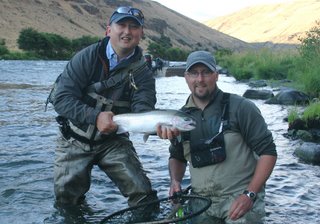
Tuesday, October 21, 2008
Sunday, October 19, 2008
Be a Better Client
I find myself fortunate to have the luxury of taking multiple guide trips every year at numerous venues, locally, nationally, and internationally. Perhaps, the trips that I look forward to the most are the trips with guides that I have fished with on multiple occasions. I consider myself to be a reasonably competent angler though not an expert. And certainly, I can catch fish without a guide. However, I feel that on successive trips with a particular guide, the knowledge gained becomes deeper and more enriched than the superficial details such as which fly to use or how long to make the leader. Given my opportunities to fish with guides, I'm frequently asked for recommendations or advice on booking a guide. To anglers that haven't had the chance to fish with a guide, I'm asked what differentiates an adequate from an excellent fishing guide? I've recently begun wondering about what makes a good client? Obviously, one that tips well, doesn't break the guide's gear, and doesn't cancel at the last minute is a good candidate. I believe it is safe to assume that the majority of the fly angling crowd observes these tenets. More importantly, how can we as clients get the most out of our guide trips? Here are a few suggestions to ponder.
1. Ask the word "why" all day long. I really don't see the purpose in trying to memorize the guide's favorite fly, mark GPS coordinates of a productive area, or write down how they rig a certain leader. Instead, I want to know why they choose that fly, that leader or that particular area. In scientific studies, a concept known as "external validity" is used to analyze the conclusions of any publication. The idea is that the conclusions drawn by the author may or may not apply to other situations, populations or environments.
Fortunately in fly fishing, most observations will have external validity. The saltwater loop knot that Jose' teaches me turns out to be a great knot for tying a trailing hook on a tube fly. But most importantly, don't memorize the knot. Ask your guide, why he uses that knot in that situation for that species of fish on that particular sandy bottom. Chances are, you will never be faced with that exact situation again, but you will be faced with similar factors that affect your fishing repeatedly over your "fishing education". I'd also like to think that by asking your guide "why" you are also enriching your guides experience with you as a client. I find nothing more rewarding than taking a technique that a guide taught me, applying it to a different river or species, and catching a fish because of the lesson learned from the guide.
2. Ask your guide about the river, body of water or saltwater flat. I love to learn the stories that shaped that river basin, or how local fishermen were taught to trap lobsters or why that rock formation was formed. Most guides have a background that extends well beyond fishing. Why not learn from that background? It's what makes each of us interesting and unique. Asking about a particular bird's call, a type of native plant or the history behind those old pilings. These stories serve to enrich the overall experience of a day on the water with a guide.
3. Breathe in. Take in all that surrounds you. I'm terribly guilty of violating this principle. Instead of treating the day as a competitive contest, take the time to enjoy all that is around you. While your guide is rowing your from run to run, appreciate the beauty of the river, the mystery of the fog, or the sheer quiet of the day. How fortunate we are that we can take time out of our busy schedules to fish only for fun. Savor the moments spent with an old friend or develop new friendships with the others that share your boat.
I have to admit that I'm impressed with the overall knowledge and enthusiasm of the many guides that I've fished with over the years. They seemed to be doing everything within their power to provide me with a memorable day on the water. Isn't it time to make sure that that we are holding up our end of the arrangement? Given that the cost for a trip is usually fixed, in a way, the more we learn from our trip, the cheaper each lesson becomes.
************************************
Charlie Chambers
Hood River, OR USA
cchamber@alumni.rice.edu
"All good things...come by grace,
and grace comes by art,
and art does not come easy."
Norman Maclean
************************************

